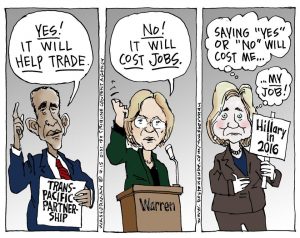
The Trans-Pacific Partnership (TPP) is a 12-nation trade agreement which was signed by Obama in 2016 and never ratified by the U.S. Congress. After President Trump took office, he formally withdrew from TPP, although he later indicated he might reconsider (which was viewed as a bit strange, since he’d called it “a continuing rape of our country” on the campaign trail. During various mentions on the campaign trail, it seemed that Trump had viewed the TPP as giving China a continuing unfair advantage over the U.S. in trade (hence the “rape” comment), although one of the main purposes of the agreement was to strengthen an alliance of the 12 nations to gain leverage over China. After the U.S. withdrew, the other 11 countries (including, for example, Canada, Mexico, Australia, Japan, and Chile) revived and finalized the agreement without us.
It is fair to say that the American public does not know a lot about trade agreements, particularly one as complex and detailed as TPP. None of the 2016 candidates really had to know a lot about it, because it had been advanced by Obama and was opposed by labor unions and manufacturing workers. That made it easy for Trump to decide on his position, and he could easily stick Hillary Clinton with her support for it, no matter how much she tried to wiggle away. This helped Trump score big political points in the blue-ish red industrial states that he ultimately carried. The only question then was what to do next. His brief flirt with re-entering TPP came against the backdrop of threatening a trade war with China — exactly the sort of scenario that TPP was aimed at preventing.
TPP aims to eliminate most protective tariffs and other protective practices among the nations, avoid and simply mediation of trade disputes, and protect intellectual property; in short, these are objectives we would like to achieve with China. I served a 3-year term as an appointee with the Department of Commerce during the negotiation of the TPP and so I was familiar with some of the issues relating to intellectual property. TPP seemed to be a well balanced agreement, although, ironically, I learned that it had significant opposition in other countries (such as New Zealand) where people felt that the U.S. was taking advantage of them. What we call “very unfair” to us is often perceived very differently overseas.
There is no question in my mind that we would be better off now as a member of TPP, and that our current situation is a result of political posturing at the expense of the wealth of our nation and its businesses. American industrial workers do tend to oppose the TPP (do they favor any trade alliances?) and I am sympathetic to that point of view. However, it is clear that American jobs are being lost to China, not to Chile and New Zealand — so exactly the president’s apparent reason for opposing the TPP is the reason we should have become part of it, instead of separating ourselves from 11 nations with whom we already had a ratified agreement. President Trump promises to negotiate better agreements with everyone, because he prides himself in making good deals. Having seen what goes into one of these agreements, I am not so confident that scrapping a done deal is the best step toward a better deal.
Most importantly, this is an area where most of us should admit how little we know, and look for honest leadership (I’m not singling anyone out, because it’s hard to find any leader who explains TPP honestly). Given that our stated policy continues to be “fair and open” trade, which I think can only be our policy, we should be allowing our trade experts to negotiate agreements that advance the ball in that direction — as TPP certainly does — and not standing in their way just because it is politically convenient to do so. As voters, we should expect and demand progress. In some areas, like education and energy, we just don’t have enough progress. In other areas, like trade, we seem to believe that going backward is acceptable. That’s what we’re going with TPP. Even if this has the President’s wholehearted attention for six more years, I don’t see how we’re going to end up with anything better.
